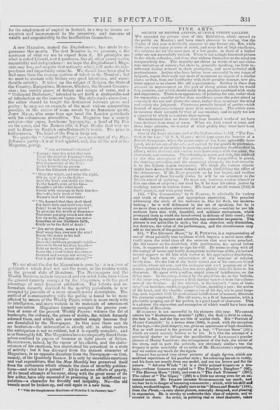A new Magazine, named the Englishman':?, has made its ap.
pearance this month. The first Number is, we presume, a fair specimen of what we are to expect from it. Its principles are what is called Liberal, and it professes, like all other young Works, impartiality and independence : we hope the E;lglishinan's Maga- zine may live, and acquire that authority which will make its inde- pendence and impartiality valuable. We should have been glad to find more than the average portion of talent in the Number ; but we must be content with finding very good intentions, and consi- derable activity. It takes up the subject of Reform, the State of the Country, Emigration, Hanover, Cholera, the Record Commis- sion; has sundry pieces of fiction and scraps of verse, and a " Colloquial Dictionary," intended to set forth a cyclopwdia-sort of information on the current topics. The stylewants correction : the editor should be taught the distinction between prose and poetry : he may see an example of the most vicious composition possible, in the review of some novels by an American quick, Joint NEAL, who some time ago beset the London periodicals with his voluminous absurdities. The Magazine has a comely exterior—fair paper, handsome typography, a head of DE FOE on the cover, and the Roman villa di Papa Giulio (but why re- sort to Rome for English embellishments ?) inside. The price is half-a-crown. The head of DE FOR is finely cut.
We quote the "Autocrat's Prayer," as a specimen of the Eng- rishman's poetry : it is at least spirited, and, like all the rest of the Magazine, young.
TIIR AUTOCRAT'S PRAYER.*
" Europe ! hear the voice that rose From the chief of Freedom's foes, When he bade war's thunders roll O'er the country of the Pole : To his Cossacks on parade Thus the Calmuck robber said-
" Mine the might, and mine the right, Stir ye, spur ye to the fight— Bare the blade and strike the blow To the heart's core of the foe— Slaughter all the rebel bands Found with weapons in their hands—
On !—the holy work of fate Russia's God will consecrate ! " ''Tis decreed that they shall bleed For their dark and trait'rous deed. Poles ! to us by conquest given ! Ye provoke the wrath of Heaven— Therefore purging sword and shot Use we must, and spare you not— Guardian of our Nerthem faith, Guide us to the field of death "'Ere we've done, many a one Shall weep they ever saw the ! Rouse the noble in his hall
To a fiery festival— Dash tli.2 stubborn peasant's mirth— Drown in blood his alien hearth— Babe or mother, never falter— Spear the priest before the altar— Onward and avenge our wrong !— God is good and Russia strong !' " We are afraid the day for Magazines is gone by : it is a form of publication which does not suit the wants of the reading world, in the present state of literature. The Newspapers and the Weekly Reviews, in their improved and extended form, have taken the ground formerly occupied by the Magazines, with the great advantage of more frequent publication. The talents and in- formation formerly devoted. to the monthly periodicals, is now occupied by journals of a more miscellaneous description. The method of communicating with the public is found to be more efficient by means of the Weekly Paper, which is more ready with its intelligence, and more various in its materials of amusement and instruction. Magazines formerly occupied the precise posi- tion of some of the present Weekly Papers : witness the list of bankrupts, the obituary, the prices of stocks, &c, which formerly adorned them, and which are now omitted simply because they are forestalled by the Newspaper. In this case there can be no hesitation—the information is clearly old: in other matters the anticipation is not so evident, but it is equally complete, and is as thoroughly felt. The Magazines have consequently found them- selves confined to papers of humour or light pieces of fiction. BLAcitwoon, indeed, by the vigour of his efforts, and the elabo- rateness of his exertions, has maintained his periodical in a state of activity : but it has diverged from the ancient character of Magazines, in an opposite direction from the Newspaper—in that, namely, of the Quarterly Review. It is only by incredible exertions and vast expenditure, that the New Monthly has preserved itself from the euthanasia which attends the class of monthly publica- tions—and what has it gained ? All its arduous efforts of gayety, all its broad attempts at humour, along with the mat name of its late editor, have only succeeded in procuring it an indifferent re- -putation—a character for frivolity and insipidity. No—the old -vessels must be broken up, and cast again in a new form. • "Vide the blasphemous Manifesto of Nicholas I. in January last."


























 Previous page
Previous page